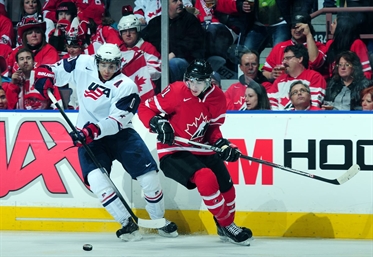New Year’s Eve IX
New Year’s Eve IX
Canada-United States ready to close out 2013

 Canada and Team USA last faced each other at the World Juniors for a New Year's Eve game two seasons ago in Edmonton. Photo: Andy Devlin / HHOF-IIHF Images
Canada and Team USA last faced each other at the World Juniors for a New Year's Eve game two seasons ago in Edmonton. Photo: Andy Devlin / HHOF-IIHF Images
Of course, it’s not always possible to schedule such a game (i.e., if the teams aren’t in the same group), but the nations have met eight previous times on the final day of the year. Canada holds a decisive advantage, having won five and tied one.
What’s more startling is how the teams have gone on to play in the tournament after the New Year. Canada has won a medal every time except 1981, when it finished 7th. This was in the days before the Program of Excellence, though, when a club team represented Canada at the U20 and the format was strictly round robin. The medal tally includes three gold (1988, 2006, 2009), two silver (1999, 2010), and two bronze (2000, 2012).
The Americans, on the other hand, have won only one medal, a gold in 2010. They have finished 4th twice, and 5th, 6th, 7th, and 8th. In short, the trend shows that if Canada wins, it is able to use the victory as a springboard to greater success in the playoff round. The Americans have shown that a loss is demoralizing enough to compromise the rest of the tournament.
Of course, this may or may not mean anything tonight. None of the players in the game today played at the last meeting two years ago, and, in truth, there are very few junior-league rivals or teammates facing each other.
The Canadians are made up almost entirely of selections from the junior leagues while the Americans are predominantly NCAA players. Two exceptions are goalie Anthony Stolarz, who plays for the London Knights of the OHL, and Adam Erne of the Quebec Remparts of the QMJHL. Stolarz is not expected to play today, but the Canadians do have two of his teammates, Bo Horvat and Josh Anderson.
Continue readingErne is familiar with four Canadians from the Q, notably Anthony Mantha, Jonathan Drouin, Frédérik Gauthier, and Charles Hudon. Canada’s Zachary Fucale also plays in the Q and might well get the start.
As for this year’s tournament so far, the Americans have been as impressive as the Canadians have not. In the case of the former, they sport a 3-0-0-0 record and a 19-4 goals difference. They have breezed through the preliminary round and have points from 19 of the 20 skaters. A more balanced attack you will not find.
A curious stat reveals that they have scored eleven power-play goals, by far the most. So, on the one hand, they are deadly with the extra attacker, on the other they seem to have trouble scoring 5-on-5. There is a clear message to Canada here. Stay out of the penalty box and your chances of winning improve greatly.
That being said, staying out of the box is exactly the problem Canada has had. And in a hard-hitting game, as tonight’s surely will be, discipline and not retaliating become of paramount importance for both teams.
Defensively, the U.S. has allowed the fewest shots to date, only 69, and have the second fewest penalty minutes, just 26 (13 minors).
Canada has scored 16 goals, which is impressive enough, but Anthony Mantha has been in on nine of that number, an extraordinary performance, to be sure, but also a significant imbalance and the polar opposite to the U.S. offence. The message here is clear for the Americans – shut down Mantha and your chances of winning increase.
The overall picture favours the Americans by a good margin. The Americans have a clear advantage in goal, where the steady Jon Gillies has outshone his Canadian counterpart Jake Paterson. The middling performance of Fucale last game against a very beatable Slovak team is hardly reassuring.
The Americans have more speed and have made fewer mistakes from the back end, and up front the balanced scoring makes all four lines a threat.
But Canada knows how to rise to the occasion. In fact, that is what it does better than any other country, year after year. And if coach Brent Sutter starts using Connor McDavid regularly, as he did in the last half of the third period yesterday, McDavid might well settle down and become a key ingredient to a second scoring line behind Mantha’s.
The oddsmakers have to favour the U.S. in this one, but history and heart may tip the scales the other way. No matter what, it will be the final game of 2013, and it promises to be a blockbuster.
Back to Overview































































